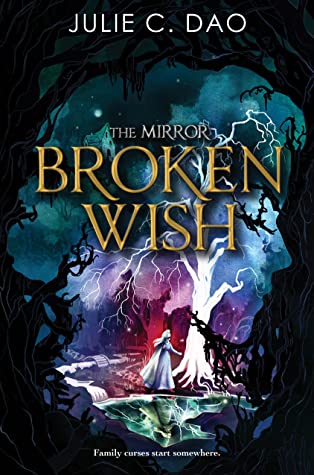 Thanks to Partner NetGalley and Disney-Hyperion for the digital ARC of Julie C. Dao’s Broken Wish in exchange for an honest review. The book will be published on Tuesday, October 6, 2020. Julie C. Dao’s Broken Wish is the first in a series of four YA novels spanning generations of a cursed family. (The authors are heavy hitters: Dhonielle Clayton, L. L. McKinney, and Jennifer Cervantes will round out the series.) I requested this one because it has so many elements I love, including witches and magic and romance. The Grimms appear, and so do magic mirrors and wishing wells. It’s a beautiful tribute to folklore and fairy tales. The book begins with a familiar story: a couple moves into a small cottage in 1840s Germany. The wife, Agnes, befriends a neighbor through baskets and gifts and written notes but hesitates to pursue the friendship because of rumors her husband Oskar has heard. Eventually, though, the two women meet and solidify their friendship, and the solitary woman, Mathilda, offers to help Agnes with her dearest wish, to have a child. She only asks in return that Agnes maintain their friendship. Oskar, however, is opposed--he’s been an outcast before and wants to escape that fate. So Agnes lies to Mathilda and breaks her promise, despite the fact that Mathilda succeeds in helping her fiend. Agnes does indeed have a daughter. Agnes’s dishonesty and betrayal begins the curse. The narrative picks up with the couple’s daughter, Elva, who has a strange magical ability and no knowledge of her parents’ history. Her parents have stayed true to their desperation not to be outcasts and have trained Elva to hide her magic from everyone, which she does . . . until she falls in love. Broken Wish is a lovely novel, filled with all the magic a lover of fairy tales could want. I enjoyed it thoroughly, and I think it’s perfect for YA readers (and some middle-graders!). I cannot wait to read the rest of the series.
0 Comments
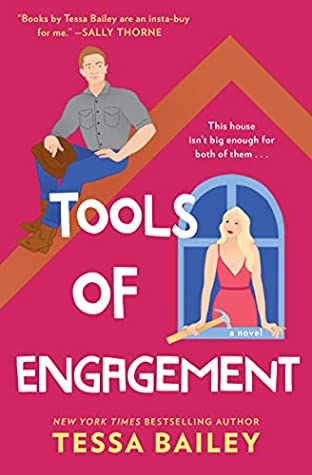 Thanks to Partner Edelweiss for the advance copy of Tessa Bailey's Tools of Engagement, out September 22, 2020. Tools of Engagement is the third book in Tessa Bailey's Hot and Hammered trilogy. This one is about Bethany Castle, the older sister of Georgie (book 1 protagonist) and friend to Rosie (book 2 protagonist). Bethany is the decorator and stager for her family's house-flipping business, but she wants to do more, to be involved in the actual flip. She's afraid, though, of doing anything that's less than perfect. She has been drawn, since the moment they met in book 1, to Wes Daniels, a construction worker who's just been hired by her brother. She and Wes pick at each other nonstop, bickering constantly. Wes is a younger man, a drifter, who came to town to care for his five-year-old niece when his half-sister had to leave. Wes takes a chance on Bethany, quitting his job in seconds to join her in the house flip that she hopes will prove her worth. And then they sign up for a reality tv show . . . This book is super steamy, and I like both Bethany and Wes a lot. There's something that fell a little short for me--I wasn't completely swept away--but I enjoyed watching these characters take a risk on each other. Overall, this is a solid enough contemporary rom com. 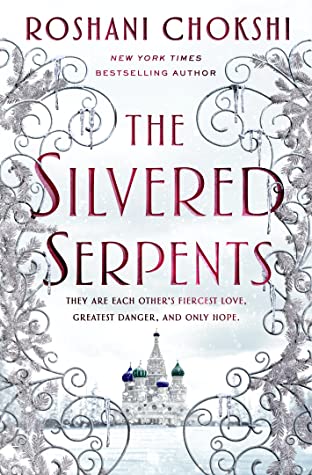 Thanks to Partner NetGalley for the digital ARC of Roshani Chokshi’s The Silvered Serpents in exchange for an honest review. The book will be published on Tuesday, September 22, 2020. ***PROCEED WITH CAUTION: SPOILERS FROM BOOK ONE, THE GILDED WOLVES, APPEAR. Roshani Chokshi’s The Silvered Serpents focuses again on the crew of Séverin as they come back together for another heist. After being driven apart by the loss of one of their own in book one, their trust has been fractured. Séverin is desperate to find The Divine Lyrics, a book that can make him a god, able both to protect his friends and to become impervious to being hurt by them or by their loss. Laila, too, wants to find the book--she believes it’s the only thing that can keep her alive. Enrique is desperate once again to prove himself: he has lost confidence since separating from his friends, unable to make his mark as an academic. And Zofia is ready to quit so she can be with her dying sister . . . until Séverin convinces her otherwise. As in The Gilded Wolves, the strengths here for me are the diversity of the group, who each come from different races, different countries, different classes, and different religions. Their disparate talents and ways of thinking mean that they can each contribute a unique strength to the group--and, of course, their magical talents are different, as well. The world here is one of a series of magical houses, unified in asserting their own superiority but also in competing against each other for new treasures and wealth and prominence, and each of the protagonists wants (or needs) something from the ruling class who runs the houses. There’s a cinematic quality to so many scenes within the novel--I love the different locations that Choskhi imagines so beautifully--and I like each of the characters and the personal challenges each is undergoing, as well. Shifting between the four points of view works well for me. I did wish for more from Séverin’s sections. I empathized with his grief, which has made it difficult for him to interact with his friends the way he used to, but I didn’t completely believe the personality change he underwent, and I wanted more from his chapters, which were my least favorite. I found Laila, Enrique, and Zofia each to be more believable and more nuanced. Overall, Roshani Chokshi’s The Silvered Serpents is a compelling story, a worthy sequel to The Gilded Wolves. 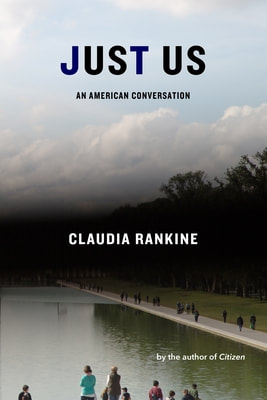 Thanks to Partner NetGalley for the digital ARC of Claudia Rankine’s Just Us: An American Conversation in exchange for an honest review. The book will be published on Tuesday, September 8, 2020. I will need to read Claudia Rankine’s Just Us again. I think it is brilliant and important and thoughtful, but I know that there’s more to absorb, more to contemplate. I read it too quickly this time, wrestled with the format of the e-book (I’m definitely going to buy it in print), and so I know that I missed details, connections, and nuance that would have enriched my reading experience even more. Still, even on a first read, I loved it. As she did in her gorgeous book Citizen: An American Lyric, Rankine uses a mixture of poetry, essays, and images through Just Us: An American Conversation. The book moves between the main pieces and connective pieces that are woven alongside the text, providing sources, in-the-moment fact checks, and further reflection. Rankine uses the intensely personal to explore the universal. She is wrestling with her own experiences as a way to grapple with American experience. She is both keenly aware of when she has been wronged . . . but she’s reflective and vulnerable enough to admit when she wrongs others, too. Her scope is wide ranging. She uses brief meetings with strangers in airports and on planes, longer conversations with friends that puzzle her, and disagreements or moments of dissatisfaction with her husband to explore her topic. She’s aiming to define whiteness, as she does in one of her classes at Yale, to try to figure out what it means to be white and how her own identity relates to that definition. She’s constantly challenging her own assumptions, her friends’ assumptions, small comments that seem to offer a key that will unlock a new insight into race in America. As she did in Citizen, Rankine presents her response in abstract and lyrical poetry, in meditations on things like tennis and college admissions, in social media, in her cancer, in her interracial marriage to a white husband. She’s looking for answers wherever she can. Often, after having written an essay about a conversation with someone, she then shares the essay with that person and shares his/her response. It’s fascinating, a true series of conversations that she’s developing with others and with herself. At one point, a friend critiques what Rankine has written because “there’s no strategy here,” and Rankine replies, “response is my strategy. Endless responses and study and adjustments and compromises become a life” (334). It’s what we all do, on some level, I think (or at least I do!): we respond to what happens and then test our responses, absorbing new information and events and meetings and conversations into our understanding. And then we do it again. This is a book I’ll be thinking about for a long time. 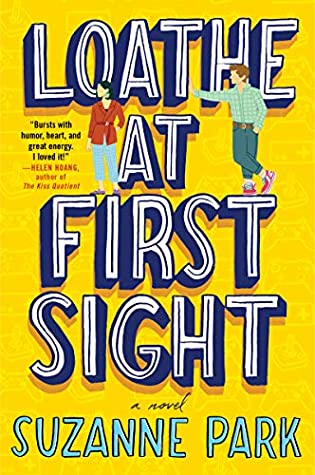 Thanks to Partner Edelweiss for the digital ARC of Suzanne Park's Loathe at First Sight in exchange for an honest review. The book is available now for purchase. Suzanne Park's Loathe at First Sight, which I read as part of a buddy read with @thechicklitbookclub, is a rom-com that defies that label. Though there is a romance, for me, it fades into the background; though there is comedy, this is a book with some serious messages. Melody Joo has started a new job as a video game producer at Seventeen Studios, a company centered on superstar CEO Ian McKenzie. Almost immediately, she faces a backlash from her officemate, Asher; intern Nolan (Ian's nephew); and Ian himself. After she makes a joke about creating a videogame featuring male strippers and fully clothed female warriors ends up becoming the company's next project, Melody's life takes a sharp turn. While she's expecting (sadly) some amount of misogyny and discrimination since (1) she's a woman and (2) she's Korean-American, she's NOT expecting the level of vitriol she gets from online trolls. After she's doxxed, the threat levels increase. Along with her work life, Melody has a lot going on. She's maid of honor for Jane, a true bridezilla, and is managing her relationship with her parents, who pressure her constantly to get married. When the threats from work start bleeding into her personal life, Melody is unable to ignore them. While the romance here is sweet, for me, it wasn't the star of this book. Watching the way Melody deals with such horrible misogyny and racism and with the challenges she faces as a woman of color in the video game industry was sobering and thought provoking. Yes, there are moments of great comedy--Melody is sarcastic and, at times, filterless, which makes for some great dialogue--but the most compelling angle was that of her journeys in this challenging workplace. |
AuthorI'm Jen Moyers, co-host of the Unabridged Podcast and an English teacher. Archives
July 2021
Categories
All
|
Proudly powered by Weebly
 RSS Feed
RSS Feed